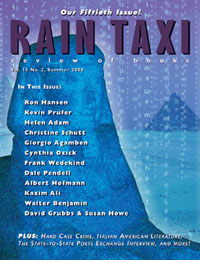 |
Rain Taxi Review of Books, Issue 50: Vol. 13, No. 2, Summer 2008 The Halo Rule
|
by Marj Hahne
In her debut collection, The Halo Rule, Teresa Leo seems reluctant to trust words, despite the contrary evidence of her honest, insistent poems. She even begins the book with a poem entitled "P.S." as if to expose the corruptible nature of narrative. I believe her: words and the story they compose can often fail to protect, to put something between the speaker and the lover who "has been running full speed with mayhem on his agenda," per the definition of football’s "halo rule."
Leo’s poems are full of marvelous words, words she works in service to her claim of their unreliability ("the difference between charm and harm // was never more than a read/delete / slip of the tongue, a letter, a screw") but which triumphantly serve poetry itself. It’s a satisfying duality to navigate, "Not weird, but lateral, where across means // bypass, sidestep, around-the-bend, through."
The language of the body—"limbs dangling like gerunds / in a moment of syntax broken in the light"—has failed the speaker, too: "And this becomes another story / that will end, eventually, in letters and limbs." In the book's third section, Leo reveals the early places of her distrust of language—"Words lost in their origins // No apostrophes here"—and of her body: "Under the hijack sky // and neon of 52 flavors of shake, / I unzipped: the reckless display // of skin and skin."
While Leo may want to disrupt or thwart linear telling, her adept echoing of words and references throughout the book—seizure, felony, math, beauty, exile, 8-Ball, book of hours, four corners, turpentine, cornfields, summer squash—reinforces the obliquely unfolding story the way foreshadowing does after you recognize it in hindsight. "How, if at all, // does narrative fit in," she asks in the book’s second section. It seems this poet wants to believe in narrative after all!
And by the book's fourth and final section, Leo does. She "comes...back from a scattering of parts and phrases," via what's more knowable than "the impermanence of words, how figures transform..." The state lines, time zones, and media that gave some kind of form to the formless have been replaced by the unsayable—"little leaps of faith," "what place / we go but can't see"—integrated with the sayable: "the words I’ll carry to the other side changed: / mercy, surrender, standdown, light."
Leo closes The Halo Rule with "Aubade," suggesting both a poem of lovers parting at daybreak and a poem greeting the dawn. Here, the former begets the latter, as illustrated by the cover image, stained-glass artist Judith Schaechter’s Virtue #8, of a nude female through a multi-paned window, wide-stanced at the center of two concentric suns, an axe in one hand and an olive branch in the other, looking upward. And for Leo, "upward" is simply a trusty word for "inward," where "Everything homebound gets in."
back
© 2008 Rain Taxi Review of Books